You Should Be Playing…
Legend of the Five Rings Roleplaying Game
In one single breath, the blade leaves its sheath like water flowing from a cup. The sounds of the court and the crowd watching fade away into the silence of the moment, with only the song of drawn steel singing into the air. The blade catches the sunlight ahead as it moves through the precise, practiced motion, its movement shining like a fiery comet in the night. The earth shifts under the pressure of the step, giving way just enough to let the power push the blade’s arc forward. In that moment, that perfect moment, the world falls away. There is only the blade, and all else is void. The breath is exhaled, and the moment is over. The world resumes. Honor has been satisfied.
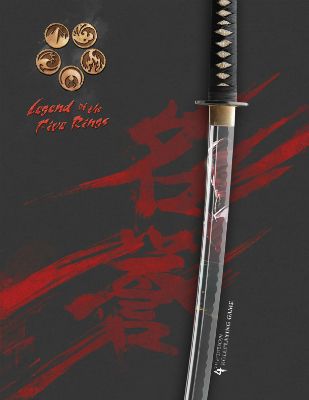 Created by John Wick, Legend of the Five Rings was originally released as a collectible card game by Five Rings Publishing Group and Alderac Entertainment Group (AEG) in 1995. Set in the Emerald Empire of Rokugan, it was a game of samurai clans warring in a fantasy world filled with powerful magic, dark gods, ancient secrets, and devotion to the way of the warrior. The Legend of the Five Rings CCG was extremely successful, and it lead to the creation of a roleplaying game in the same setting.
Created by John Wick, Legend of the Five Rings was originally released as a collectible card game by Five Rings Publishing Group and Alderac Entertainment Group (AEG) in 1995. Set in the Emerald Empire of Rokugan, it was a game of samurai clans warring in a fantasy world filled with powerful magic, dark gods, ancient secrets, and devotion to the way of the warrior. The Legend of the Five Rings CCG was extremely successful, and it lead to the creation of a roleplaying game in the same setting.
The first edition of Legend of the Five Rings Roleplaying Game was written also by John Wick and was released in 1997 by the Five Rings Publishing Group. It has since undergone three full editions, with a parallel release as the official re-released classic Oriental Adventures d20 setting by Wizards of the Coast. (WotC/Hasbro acquired the rights to the L5R card game in 1997, and prior to selling the game back to AEG in 2001 there was a creative license sharing agreement in place.) The most recent printing was 4th Edition in 2010, written by Shawn Carman, Robert Hobart, Jim Pinto, and Brian Yoon. The core book retails for $59.99, and electronic versions can be purchased through DriveThruRPG.com for $34.99.
A Storied History
With over fifteen years of history, Legend of the Five Rings has proven to be an incredibly successful game line. Beyond the flagship card game and RPG, there have been an L5R miniatures game, board games, disc war games, and even a live action roleplaying game. The strongest appeal of Legend of the Five Rings in all of its forms comes from its history of rewarding its players within the game universe. The card game’s competitive environment maintains a developing storyline, where players choose a samurai Clan to play as, and their Clan’s victories in key tournaments lead to victories in Rokugan itself. Even today, Legend of the Five Rings remains the premiere example of interactive storytelling through gaming, with an evolving world that is a direct result of its player base’s actions.
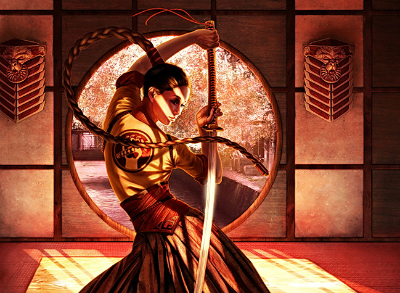 This investment holds true through to the roleplaying game. Players who come to the Legend of the Five Rings RPG are often quickly immersed in the rich and vast history of the setting, contributed to by dozens of authors over the years. Despite the number of authors, though, Legend of the Five Rings has managed to keep a vision of its game clear, and with an unmistakable message: the world is shaped by the actions of its players. While all good roleplaying games recognize this, the culture of the L5R players is almost as rich as that of the game world. Stories of in-character victories in the narrative stand alongside the oral histories of the game, informing each other along the way in a very organic development. As a community, L5R is very welcoming to its players, no matter the particular game they choose.
This investment holds true through to the roleplaying game. Players who come to the Legend of the Five Rings RPG are often quickly immersed in the rich and vast history of the setting, contributed to by dozens of authors over the years. Despite the number of authors, though, Legend of the Five Rings has managed to keep a vision of its game clear, and with an unmistakable message: the world is shaped by the actions of its players. While all good roleplaying games recognize this, the culture of the L5R players is almost as rich as that of the game world. Stories of in-character victories in the narrative stand alongside the oral histories of the game, informing each other along the way in a very organic development. As a community, L5R is very welcoming to its players, no matter the particular game they choose.
Rokugan itself is a complex setting, inspired heavily by the Japanese Sengoku period and the stories of mystic China. Drawing from roots in classical Chinese and medieval Japanese literature, the Legend of the Five Rings RPG is also influenced by the cinematic style of Akira Kurosawa, a famed Japanese film director. While previous editions attempted (and struggled) to keep pace with the card game’s progression, 4th Edition instead focuses on a sense of timeline neutrality, assisting with play at any of Rokugan’s many historical periods. While the Emerald Empire itself is over a thousand years old, very little has culturally changed for it during that period. The society created by the Kami – gods who fell from heaven after a battle with their father – has a strong belief in maintaining traditional values. The Clans they founded serve as the noble Samurai caste, consisting of the warrior bushi, politician courtiers, and magic-using priests called shugenja. Each Clan serves the Emperor, who is the Son of Heaven and the supreme ruler of their society.
Choosing The Right Path
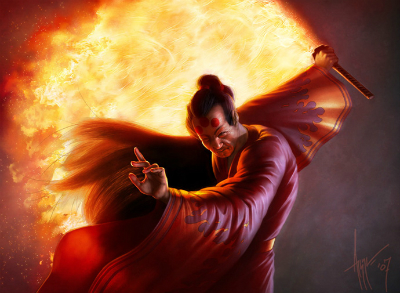 However, Clans frequently feud amongst themselves, struggling for power and glory in the Empire. Each Clan has its own distinctive style, emphasizing a particular trait. The graceful Crane Clan are artisans and duelists, while the honorable Lion Clan are devoted to combat and tactics. The enigmatic Dragon Clan seeks balance with the world while remaining apart from it, and the peaceful Phoenix Clan is the undisputed master of magic. The treacherous Scorpion Clan serves as the dark mirror to the Empire, doing what is necessary despite the dishonor, while the grim and brutal Crab Clan wages an eternal war against the demonic forces of the Shadowlands, a corrupted and evil land south of Rokugan.
However, Clans frequently feud amongst themselves, struggling for power and glory in the Empire. Each Clan has its own distinctive style, emphasizing a particular trait. The graceful Crane Clan are artisans and duelists, while the honorable Lion Clan are devoted to combat and tactics. The enigmatic Dragon Clan seeks balance with the world while remaining apart from it, and the peaceful Phoenix Clan is the undisputed master of magic. The treacherous Scorpion Clan serves as the dark mirror to the Empire, doing what is necessary despite the dishonor, while the grim and brutal Crab Clan wages an eternal war against the demonic forces of the Shadowlands, a corrupted and evil land south of Rokugan.
Finally, depending on the point in history a game runs, you may see far travelled Unicorn Clan, masters of cavalry who spent centuries in foreign lands, the ambitious Mantis Clan, forged from an alliance of many lesser clans and the greatest naval power of the Empire, and the heretical Spider Clan, created by one of the greatest villains the Empire ever had, who forsake the selflessness of Bushido for personal power.
As with the card game, players can easily engage with the archetypes represented by the Clans. Each Clan has its own distinct appeal, and there are enough of them to generate plenty of conflict. Moreover, there are even options for players to play clanless samurai, called ronin, or for a character to be part of a lesser clan, or to sidestep the castes entirely and become a monk. Rokugan is a setting that immediately starts with bold colors, quickly catches the mind’s eye, and becomes far more complex as one grows familiar with the setting. The depth of Rokugan’s culture and history is filled with characters who work firmly along their Clan’s stereotypes, as well as those who buck them and break the mold.
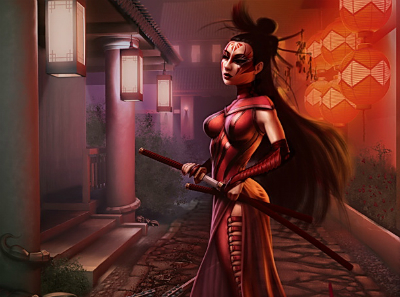 Rokugani have numerous little traditions, beliefs, and superstitions that the game provides to build a stronger world and stronger characters. Conflict arises from different interpretations of honor and morality, as some characters are challenged to live up to the code of Bushido in all things, while others discard it for a myriad of reasons. The scope of the world is huge, and yet it is not unknown for the fate of the entire world to rest in the hands of a single samurai asked to choose between the honorable course of action – and what otherwise drives them.
Rokugani have numerous little traditions, beliefs, and superstitions that the game provides to build a stronger world and stronger characters. Conflict arises from different interpretations of honor and morality, as some characters are challenged to live up to the code of Bushido in all things, while others discard it for a myriad of reasons. The scope of the world is huge, and yet it is not unknown for the fate of the entire world to rest in the hands of a single samurai asked to choose between the honorable course of action – and what otherwise drives them.
Gameplay
Legend of the Five Rings uses John Wick’s system of conflict resolution to tell these stories. Called the “Roll and Keep” system, players roll a set of ten sided dice when attempting an action, and they only keep a number of them. Often this is a roll of a Trait plus Skill. Skills represent things the character is trained to do, such as Kenjutsu for swinging a sword, Courtier for political maneuvering, or Stealth for hiding and being unnoticed. Traits are paired in elemental Rings, with Stamina and Willpower being Earth, Intelligence and Agility being Fire, Strength and Perception being Water, and Reflexes and Awareness being Air. As the game’s name implies, a fifth ring, the Void Ring, also exists. The Void Ring has no associated Trait, but instead serves as a measure of a character’s potential to tap into their connection to the greater world, becoming capable of highly heroic actions in the process.
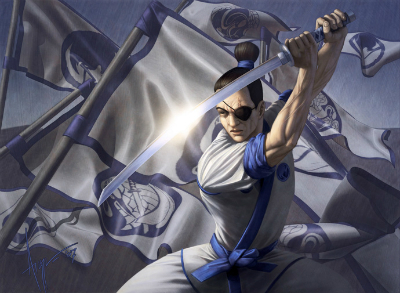 During character creation, players choose a character’s Clan, Family, and School. The Clan selection is key, as a character’s Clan determines their options of available Families and Schools. A character’s Family gives them a boost to a Trait, and their School gives them another point in a Trait, starting Skills, and a Technique – which represents the secrets of their School’s abilities. A Dragon bushi is trained to fight with two weapons, for example, while a Scorpion courtier is trained to ferret out their opponent’s weaknesses and use those against them socially. Characters are then given starting experience that they can spend on their Traits and Skills, as well as special Advantages. A player may also assign Disadvantages to their character during creation to gain more experience points to be spent. As characters increase their Skills and Traits, they gain Insight. At certain amounts of Insight, they rank up and may learn additional Techniques of their School.
During character creation, players choose a character’s Clan, Family, and School. The Clan selection is key, as a character’s Clan determines their options of available Families and Schools. A character’s Family gives them a boost to a Trait, and their School gives them another point in a Trait, starting Skills, and a Technique – which represents the secrets of their School’s abilities. A Dragon bushi is trained to fight with two weapons, for example, while a Scorpion courtier is trained to ferret out their opponent’s weaknesses and use those against them socially. Characters are then given starting experience that they can spend on their Traits and Skills, as well as special Advantages. A player may also assign Disadvantages to their character during creation to gain more experience points to be spent. As characters increase their Skills and Traits, they gain Insight. At certain amounts of Insight, they rank up and may learn additional Techniques of their School.
Although sounding potentially daunting to follow, Legend of the Five Rings plays very intuitively, with the Roll and Keep mechanic providing an engine of significant control for players. As with many games of its age, there are sub-systems for Dueling, Grappling, and Mass Battle, each of which are geared towards an expedient and dynamic resolution. Combat in L5R is notorious for being swift and extremely lethal, with most characters only being a few hits from being killed. The knowledge that the moment blades are drawn a character is risking their life creates the proper feeling of danger. As is fitting about a game of samurai drama, death is very much a part of the narrative, and it looms over every combat. How a samurai faces their death, and what they die for, can often be the most important part of their journey.
Legend of the Five Rings contains an immersive world with a compelling and intuitive style of play. The profusion of cultural nuances of Rokugan can be played up or dialed down based on a gaming group’s preferences, but they are always there. Done right, they can engage a player in a story where honor and duty conflict in the heart of someone making impossible choices. L5R is a game that has survived many challenges in its time, and it continues to flourish. It is a game of blood, honor, steel, and samurai, with a rich history, a vibrant community, and a commitment to storytelling that stands above the rest. In Rokugan, even the gods can fall before the steel of a samurai. And honor is a force stronger than steel.
And that is why you should be playing Legend of the Five Rings Roleplaying Game.
David Gordon is a regular contributor to the site. A storyteller by trade and avowed tabletop veteran, he is always on the lookout for creative tabletop games. He can be reached at dave@cardboardrepublic.com.
You can discuss this article and more on our social media!
Photo Credits: L5R cover by AEG; All L5R artwork by Steve Argyle.
